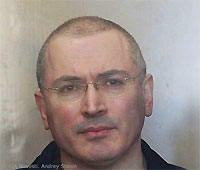Moscow City Court does not find artificial criminalization of Khodorkovsky/Lebedev business

(Interfax – January 16, 2013)
The Moscow City Court has concluded that the prosecution of former Yukos executives Mikhail Khodorkovsky and Platon Lebedev was fair because their activity had elements of a crime.
Presumptions of “artificial criminalization in the sentence on regular financial and economic activity of the Yukos oil company and its executives are inconsistent,” says the statement of reasons of the Moscow City Court Presidium that has heard the appeals of the convicts in their second case.
The presidium resolved that Khodorkovsky and Lebedev interfered in “managerial, financial and economic operations of the joint stock companies in violation of the companies’ charters and civil rights, including the right to freely manage one’s property and receive maximal revenues as guaranteed by Russian laws.” The judges said that the conduct of the former Yukos executives carried elements of a crime of which they were accused.
The court rejected as unfounded the claims that the Yukos case had an accusatory trend. “Claims of the accusatory trend and the court’s obstruction of defensive procedures made in the appeals are unfounded and not confirmed with materials of the case,” the resolution says.
“There is no information in the case file about the deliberate infringement of procedural rights of the defendants and their lawyers by the presiding judge,” the panel said.
Also, the Moscow City Court Presidium noted that the defense should not have referred to results of public examinations, such as a report of the Presidential Council for the Development of Civil Society and Human Rights and a report of the Institute of Human Rights of the International Bar Association.
The Moscow City Court Presidium cut the sentences of Khodorkovsky and Lebedev to 11 years in December; the panel thus brought sentences in both Yukos cases in correspondence with Russian laws. Both businessmen will be released from prison in 2014.
“The prison term reduction is an ostrich policy of the court, decisions of which many educated people in Russia and the world are laughing at,” Khodorkovsky said. “It is a pity that the already not quite flawless reputation of Moscow courts is being dented further. I want to believe that the Russian Supreme Court will make a worthier decision,” he said in a statement posted on the Yukos press center website.
